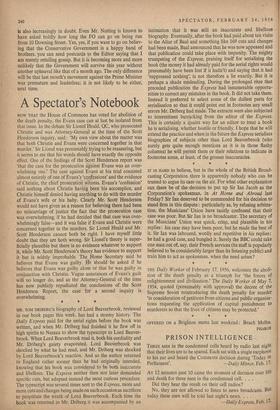A Spectator's Notebook
NOW THAT the House of Commons has voted for abolition of the death penalty, the Evans case can at last be isolated from that issue. In the debate Sir Lionel Heald, QC, who prosecuted Christie and was Attorney-General at the time of the Scott Henderson inquiry, said : 'My own view about the matter was that both Christie and Evans were concerned together in that murder.' Sir Lionel was presumably trying to be reassuring, but it seems to me that his words should have exactly the opposite effect. One of the findings of the Scott Henderson report was `that the case for the prosecution against Evans was an over- whelming one.' The case against Evans at his trial consisted almost entirely of one of Evans's 'confessions' and the evidence of Christie, the chief prosecution witness. Evans's 'confession' said nothing about Christie having been his accomplice, and Christie himself denied having anything to do with the murder of Evans's wife or his baby. Clearly Mr. Scott Henderson would not have given as a reason for believing there had been no miscarriage of justice the fact that the prosecution case was overwhelming, if he had decided that that case was over- whelmingly false—and it was false if Evans and Christie were concerned together in the murders. Sir Lionel Heald and Mr. Scott Henderson cannot both be right. I have myself little doubt that they are both wrong. Sir Lionel's theory is super- ficially plausible but there is no evidence whatever to support it, while Mr. Scott Henderson's theory has evidence to support it but is widely improbable. The Home Secretary said he believes that Evans was guilty. He should be asked if he believes that Evans was guilty alone or that he was guilty in conjunction with Christie. Vague assurances of Evans's guilt will no longer do, and as the Attorney-General of the time has now publicly repudiated the conclusions of the Scott Henderson Report, the case for a second inquiry is overwhelming.
* * *


































 Previous page
Previous page